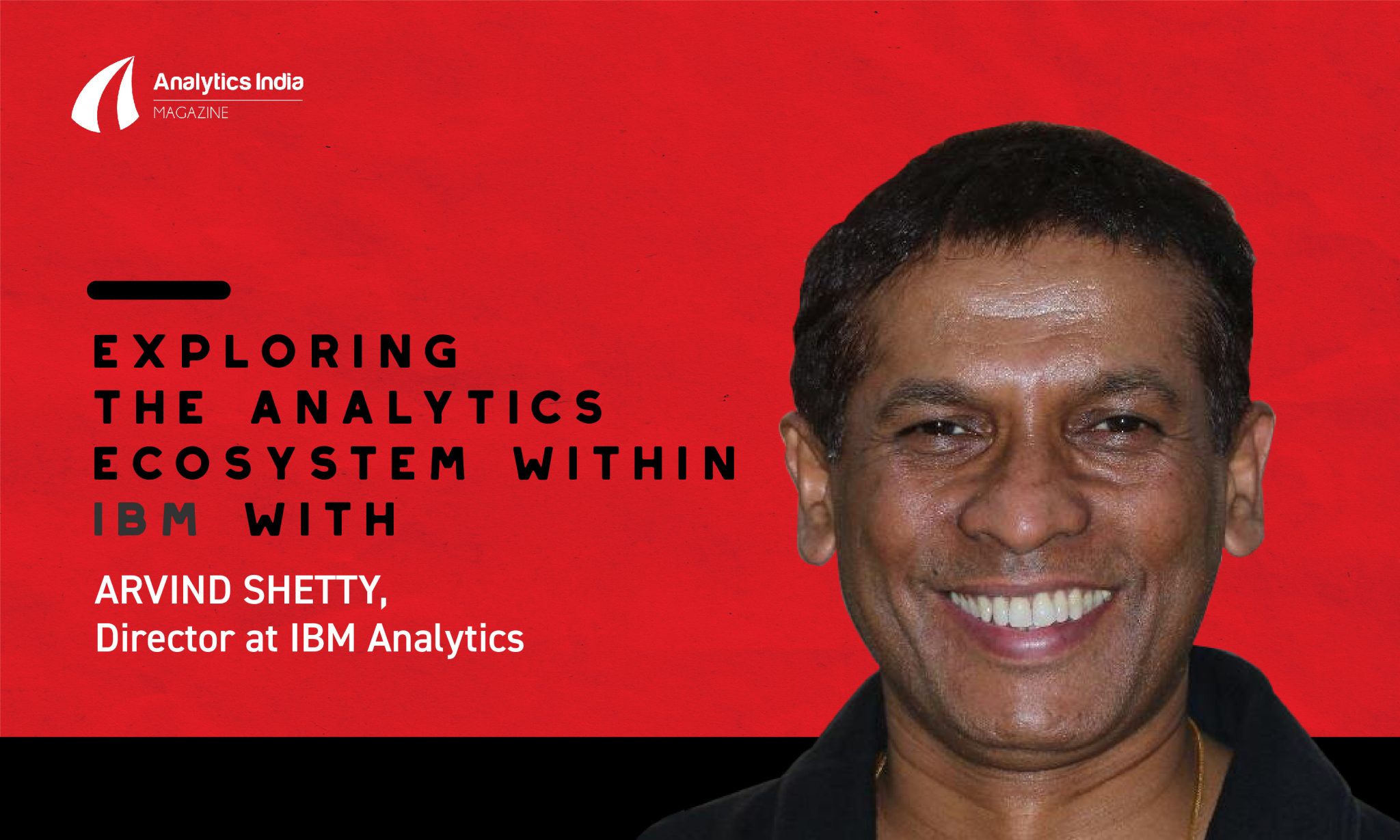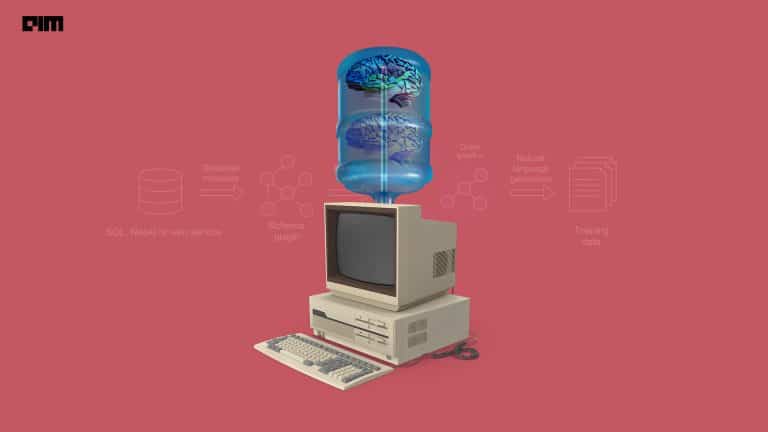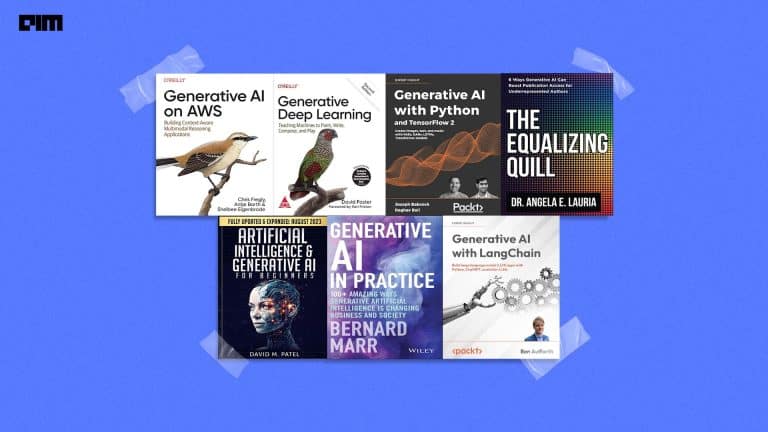
Arvind Shetty brings with him over three decades of IT industry experience, and has held diverse set of roles at IBM. Arvind joined IBM in 2003, and his assignments have included leadership of the IBM Java Technology Center, the ISL Talent Development program, the Infosphere development and Cloud hosted offerings mission.
Arvind has also led the worldwide development responsibilities for a range of offerings and development missions, including the Information Server On-prem Customer Commits, IS on Hadoop, Optim, MDM, Data Replication, and Information Lifecycle and Governance. Across all his roles, Arvind has brought a rare empathy and exceptional focus to ensure customer success and employee empowerment.
In 2015, Arvind was also selected as an IBM Manager Champion, to be an advocate, role model, and mentor to managers and thought leaders, one among 50 such appointments worldwide. Analytics India Magazine got in touch with Arvind Shetty, the Director of Analytics for IBM India Software Labs to find out how the organization is making use of analytics to address unique business and industry challenges.
Analytics India Magazine: What factors led to IBM venturing into the analytics space? Describe the journey so far?
Arvind Shetty: Today, every discussion about changes in technology, business, and society begins with data. In its exponentially increasing volume, velocity and variety, data is becoming a new natural resource. We realized traditional systems could no longer keep up with Big Data in constant motion. This required a paradigm shift with new systems that don’t need to be programmed, rather they learn from vast quantities of information ingested from experiences and interactions with people.
We also saw that data will be the basis for competitive advantage. Leaders will drive business outcomes by applying sophisticated analytics across disparate data sources within the organization. Besides, they will capture the time value of data by developing speed of insight and enabling speed of action, and changing the game in their industry or profession with cognitive capability.
We are driving growth by helping our clients integrate all data sources — structured and unstructured; and applying a range of analytics — descriptive, predictive, and prescriptive. We combine this capability with deep knowledge of industries and professions. We have invested in and built the capabilities—cloud, analytics, cognitive, mobile, and security to power the emerging needs of modern business.
This is a strong and growing business, but its potential is actually much greater. That potential lies in the 80 percent of the world’s data that is unstructured: everything we encode in language, from textbooks and formulas to literature and conversation, besides all the digital video, audio, and images. With cognitive technology, we can now probe this “dark data.” Cognitive includes but is broader than artificial intelligence, machine learning, and natural language processing. And its embodiment is Watson.
We have built the world’s broadest and deepest portfolio in data and analytics where:
- Over 8.2 million software developers are using cognitive computing, tapping IBM’s cloud, data analytics, and Watson capabilities to create whatever they can envision. By 2018, it is expected that more than half of developers will embed cognitive services into their applications
- 6,000 police departments around the world can now access more than a billion shareable documents from the cloud. They apply intelligent analytics to predict and prevent crime in ways which were not possible before, leading to reductions in violent crime of up to 40 percent in some U.S. cities.
- IBM also added acquisitions to its analytics portfolio, which includes Truven, a leading provider of healthcare analytics solutions; and IRIS Analytics which provides technology and consultancy services to the payments industry to detect electronic payment fraud.
AIM: Mention some of the impediments in the arena. What is IBM’s strategy towards tackling those challenges?
AS: One of the key impediments in the arena includes skill development for the new technologies. Recently ‘Upskilling India,’ a study conducted by IBM Institute for Business Value indicated that 60 percent of global executives expect employees will need new and different skills to be successful. The study also highlights that 61 percent of the respondents believe that India’s higher education system is slow in responding to the changing social demands and needs, followed by 59 percent of the respondents expressing the challenge in maintaining a relevant curriculum for students.
To address this growing skill gap, IBM has partnered with several institutes to equip developers, data scientists, and university students with the educational resources required for the ‘new collar’ jobs. Recently IBM and Galvanize announced the launch of the first online Cognitive Builder Course hosted on IBM Cloud and powered by IBM Watson. This partnership delivers hands-on skills training to prepare the next-generation of developers and data scientists to better understand and innovate with AI and cognitive technology, directly impacting the way enterprises derive insight from data.
AIM: What is IBM strategy towards encouraging innovation at the firm? Present us with a picture of the innovation lab at IBM.
AS: Innovations is one of the key focus areas, and is an integral part of our core values ‘innovations that matters — for our company and for the world.’ With 24 Years of IBM Patent Leadership as backing, we have IP Development and Harvesting programs which provide the basis for this level of leadership. IBM also conducts Innovation Jams to encourage Ideas and Innovative approaches for existing solutions.
Besides this, IBM has a dedicated Research Unit called the IBM Research Labs with centres across the world. They primarily focus on solving unique technology impediments.
AIM: IBM Analytics offers a complete portfolio of big data and analytics solutions to fuel your cognitive business. Please walk us through your solution portfolio.
AS: The IBM Analytics Portfolio covers Data Management, Unified Governance, Content Management, Data Science, Business Analytics, Big Data, Watson Data Platform and Watson Services.
In the Data Management space, IBM provides Hybrid Databases, Data Warehousing Solutions and different types of NoSQL Databases. IBM’s Unified Governance space, provides all the capabilities needed for Information Integration, Governance, and Data Lifecycle Management. In the Content Management space, there are various solutions for dealing with documents, imaging, and other needs surrounding unstructured and semi-structured Data.
IBM’s Data Science division provides most of the capabilities needed by a Data Scientist Persona, primarily oriented towards Data Wrangling needs. The Business Analytics space comprises of solutions needed for BI, Performance Management, and Discovery of Insights. In the Big Data space, IBM furnishes solutions for building and managing Data Lakes.
This is not all. The Watson Data Platform brings together many services like Apache Hadoop, Spark, Machine Learning, Streams, Asset Catalogs, and Big Data Governance components as a set of Fabric Services. Additionally, the Watson Services provides for all the Cognitive aspects of analytics to be blended for conversation, discovery, language, speech, vision, and empathy gauges.
AIM: IBM furnishes Predictive analytics and data visualization services through its Watson platform. Can you shed some light on this statement, explaining how this solution is benefitting your clients in India?
AS: The Predictive Analytics capabilities on Cloud are offered under the name IBM Watson Machine Learning Service on Bluemix. For regular visualization, IBM offers Watson Analytics. On the other hand, IBM Cognos Software on Cloud facilitates advanced visualization and reporting.
AIM: Present a case study where you used your analytics based solution to address business challenge for one of your clients. How did they see value out of your solution?
We have a lot of industry-specific case studies catering to our analytics value proposition. Eliminating welfare fraud and delivering the right benefits to the citizens who need them the most is important. Moreover, Economic assistance provides a safety net for vulnerable citizens. The Government of Odisha found it a challenging job to allocate benefits to the people who needed them the most.
The organization used IBM Analytics solutions to match claimant records to corresponding tax, income, and property records. This helped towards identifying around 500,000 individuals, who were wrongfully claiming benefits. With newfound visibility into which citizens truly qualify for social assistance; the organization can ensure that vital resources are distributed fairly and taxpayers’ money is better utilized.
Benefits of implementing the solution:
- Ensures that vital benefits go to citizens who are truly in need.
- 500,000 wrongful claimants identified and removed from the system.
- Saves costs and effort, helping the government make the best use of its resources.
AIM: What does the IBM future look like in a data-driven industry?
AS: Enterprise requirements will continue to evolve with the shifting business dynamics. The data driven industry will look for solutions to simplify data, leverage, and maximize insights from their own data. Besides, platform for unified governance and a data fabric will provide access to all enterprise data through a common interphase. Our mission is to make data simpler and help enterprises be ready for the data-driven era.
IBM recently announced ‘Download and Go’ for DB2 which allows you to download and see value in fifteen minutes. We also believe that it’s best to bring Machine Learning to the data source, and hence we brought Watson Machine Learning on IBM Cloud, followed by mainframe. Furthermore, we recently introduced Machine Learning and Data Science to Hadoop where the data resides. We don’t dictate framework or language as the open platforms helps bring more people to the table.
We have built Watson Data Platform which allows enterprises to access all data from a single interphase, collaborate, share new insights, and build smarter scalable applications in less time.

















































































